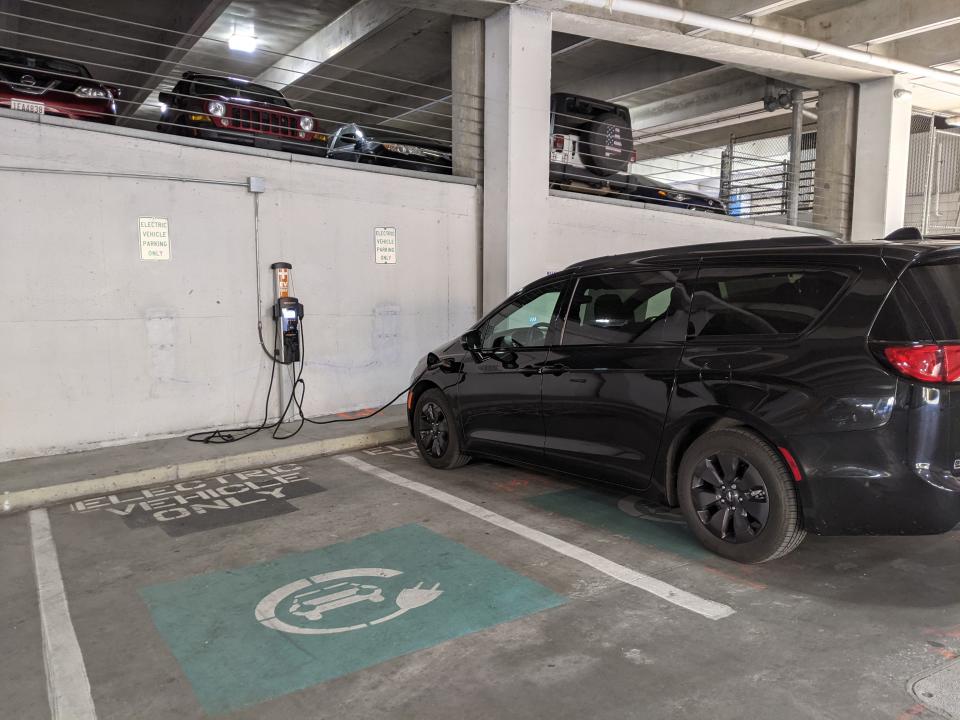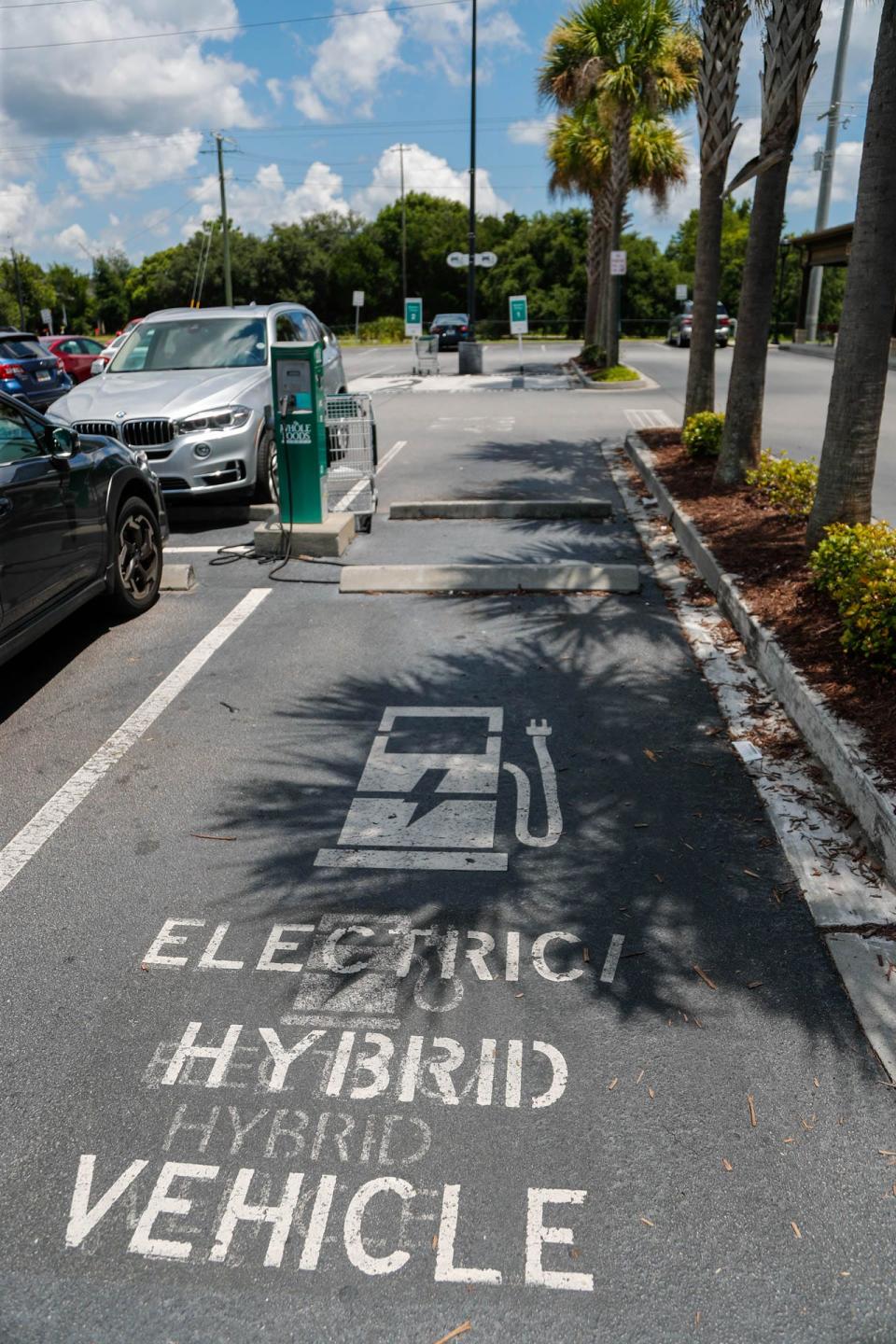Will 2023 be the year the electric vehicle hits the fast lane in North Carolina?

- Oops!Something went wrong.Please try again later.
It was an expenditure that doesn't usually make much of a ripple, especially when compared to the other big-ticket issues on the agenda. But at Tuesday night's Wilmington City Council meeting, council members unanimously agreed to spend $20,000 awarded to the Port City from a statewide settlement with Volkswagen to add two charging stations to the city's convention center parking deck. The charging points will join existing charging stations in the city's three other downtown public parking decks.
Little by little, charging point by charging point, a public ecosystem is emerging to support the electrification of the state's vehicle inventory. While plenty of work needs to be done, including more publicly accessible chargers in rural areas and for apartment dwellers in urban areas, electric vehicles (EV) are becoming more of a viable option for more North Carolinians − despite vehicle prices still giving some would-be converts sticker shock.
"I think North Carolina is sitting in a really strong position right now," said Stan Cross, electric transportation policy director for the Southern Alliance for Clean Energy, ticking off public and private initiatives that are making EVs more accessible, affordable and a growing segment of the state's economy.
More:NC's dirty secret: Vehicles account for more greenhouse gas emissions than power plants
A lot of the push to adopt electric vehicles is being accelerated by governments, using the powers of their office to push industry and consumers to give non-traditional vehicles a chance. The goal is to help wean the country off fossil fuels, which are the primary source of heat-trapping greenhouse gases that are warming the atmosphere and intensifying climate change. According to environmental regulators, transportation emissions are the leading contributor of greenhouse gas emissions in the United States and in North Carolina.

Roughly a year ago Congress passed President Joe Biden's massive $1 trillion infrastructure bill which includes billions for helping the country transition to an electric vehicle future. For North Carolina, the legislation earmarked $109 million over five years to build out the state's network of charging stations. It also opened the door for the state to apply for billions more in grant funding to further expand its network.
Gov. Roy Cooper also is charging up North Carolina's efforts to move toward an EV future with his executive orders. Building on an earlier executive order, Cooper signed a new order in January that calls for an increase in registered zero-emission vehicles − which generally refers to a vehicle that does not emit exhaust gas or other pollutants − to at least 1.25 million by 2030, nearly 40 times the current number of zero-emission vehicles registered in the Tar Heel State. The initiative also pushes for 50% of sales of new vehicles to be zero-emission by 2030.
Charging up big rigs
Then in October Cooper issued Executive Order 271, which calls for state environmental regulators to come up with sweeping new clean truck regulations by May 2023. The rules would aim to require truck and bus makers to increase the sales of electric vehicles starting in 2025, with further increases required in coming decades, and for North Carolina to study the need for more charging stations to support the electrified heavy vehicles.
The goal's aim is to speed the switch to electric heavy vehicles which remain among the biggest emitters of climate and health-damaging particulates through their diesel engines.
SUCKING UP CARBONCan adding volcanic rock to an Outer Banks beach help save the planet?
"While trucks and buses only account for 4 percent of vehicles on the road, they are responsible for nearly 25 percent of total transportation sector greenhouse gas emissions," states the California Air Resources Board. "In fact, emissions from trucks are the fastest growing source of greenhouse gases, and the number of truck miles traveled on the nation’s roads is forecast to continue to grow significantly in the coming decades."
Cooper's order also aims to place North Carolina at the forefront of an emerging industry that has lagged the move to electrify smaller vehicle fleets.
“North Carolina has already made great progress in electric vehicle manufacturing, and we’re well-positioned to be at the head of the global market transition to zero-emission vans, buses and trucks,” Cooper said after an electric truck conference at N.C. State University in October where he unveiled his new order. “We’ll continue working with businesses and manufacturers across the state to strengthen our economy, create jobs and confront the climate crisis.”
If the new rules are adopted, North Carolina would becomes just one of a handful of states − and the first in the Southeast − to have adopted the lower-emission rules for heavy truck and bus fleets. The state already has joined with 15 other states and the District of Columbia in pledging to ensure that 100 percent of all new medium- and heavy-duty vehicle sales be zero emission vehicles by 2050, with an interim target of 30 percent zero-emission vehicle sales by 2030.
Cooper's push to electrify truck fleets has generated some negative feedback from the trucking industry and some state legislators who fear the move could put the state's trucking firms and manufactures at a competitive disadvanatge.
But Cross said the executive order, which doesn't carry the weight of legislation and can be reversed by future governors, isn't tying the hands of the state's important trucking industry.
"It doesn't mandate that fleet operators have to buy electric busses or heavy or medium trucks," he said. "It mandates that manufacturers sell an increasing number of them, and with many states, local governments and businesses pledging to de-carbonize their transportation fleets, it represents a real economic opportunity for these companies."
Growing momentum
Signs of a growing electric vehicle footprint in North Carolina are also appearing across the state.
Prep and other work is moving forward on two huge manufacturing projects that cement North Carolina's role in the country's EV future − a Toyota battery plant, the Japanese automaker's first in the U.S., in Randolph County; and Vinfast's EV manufacturing plant, the first in the country, in Chatham County. The Vietnamese manufacturer recently shipped its first batch of EVs to the United States.
GOING BIGNC bets big with taxpayer money to land major projects, but are they good investments?
Sales of EVs nationally in North Carolina also are surging, although they still remain a fraction of overall vehicle sales. Cross said sales of EVs nationally rose 37% in the third quarter of 2022 compared to the same period a year ago, pushing the percentage of new car sales that are EV to 7%.
"That's important because once you cross that 5% threshold and stay above there, that's when past history of disruptive technology shows us that you start to see the beginning of exponential adoption growth," he said.
A survey by Consumer Reports earlier this year of nearly 8,000 consumers found that 14% of them were definitely buying an EV and 22% were seriously considering it.

New federal tax credits for EVs − including used electric vehicles − that hit the market in January should help keep sales increasing, and a slew of new models that manufacturers plan to roll out next year − including pickups and SUVs − which offer improved range should also spur more interest in the EV market.
"One of the biggest barriers to EV adoption is consumer awareness about what's available, will it have the range I need, and how much do they cost," Cross said. "So when you see your neighbor driving an EV, members of your family driving an EV, that's what really gets people excited about the new technology."
Reporter Gareth McGrath can be reached at GMcGrath@Gannett.com or @GarethMcGrathSN on Twitter. This story was produced with financial support from 1Earth Fund and the Prentice Foundation. The USA TODAY Network maintains full editorial control of the work.
This article originally appeared on Wilmington StarNews: Is 2023 the year electric vehicles in NC go from fringe to mainstream?

